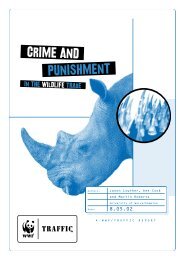Forest renaissance - The role of state forestry in Britain ... - WWF UK
Forest renaissance - The role of state forestry in Britain ... - WWF UK
Forest renaissance - The role of state forestry in Britain ... - WWF UK
You also want an ePaper? Increase the reach of your titles
YUMPU automatically turns print PDFs into web optimized ePapers that Google loves.
FOREST RENAISSANCE • THE ROLE OF STATE FORESTRY IN BRITAIN 1919-2050: A DISCUSSION PAPERSummary <strong>of</strong> key f<strong>in</strong>d<strong>in</strong>gs andconclusions<strong>The</strong> <strong>state</strong> forest lands <strong>of</strong> England,Scotland and Wales are ideally placed todeliver desired multiple benefits fromforest management <strong>in</strong> the most costeffectiveway. <strong>The</strong> establishment <strong>of</strong> threenew country-focused public sectorwoodland agencies will provide a uniqueopportunity to <strong>in</strong>ject new stimulus andmomentum <strong>in</strong>to the management <strong>of</strong> <strong>state</strong>forests for public benefits.<strong>The</strong> British public has shown anoverwhelm<strong>in</strong>g wish for forests and woodlandsto supply more than just timber, and theirsocial and environmental importance isrecognised: access, recreation, conservation,soil protection and supply <strong>of</strong> non-timberforest products. <strong>The</strong> Westm<strong>in</strong>ster Parliament,the National Assembly for Wales and theScottish Executive all agree that we need ahigh-quality forest e<strong>state</strong> to fulfil many globaltreaty commitments such as the Conventionon Biological Diversity and the FrameworkConvention on Climate Change.Private and company-owned forests can helpto supply these wider goods and services. Butcommercial <strong>forestry</strong> operations cannot beresponsible for all non-timber benefits, many<strong>of</strong> which conflict with wood and fibreproduction. <strong>The</strong> <strong>state</strong>-owned forest e<strong>state</strong> isthe most effective and efficient vehicle todeliver many <strong>of</strong> the multiple benefits fromforests.In the past, <strong>state</strong> <strong>forestry</strong> has drawn criticismfrom environmental groups and localcommunities, particularly for its reliance onlarge conifer plantations. Our analysis showsthat <strong>Forest</strong> Enterprise, as manager <strong>of</strong> the<strong>Forest</strong>ry Commission e<strong>state</strong>, has made muchprogress towards meet<strong>in</strong>g the <strong>UK</strong>’s 1992 EarthSummit commitments, <strong>in</strong>clud<strong>in</strong>g certification<strong>of</strong> all its forests to <strong>Forest</strong> Stewardship Councilstandards, which was recognised by <strong>WWF</strong> as aGift to the Earth.We believe that these changesare not only real and substantial, but alsothat <strong>forestry</strong> m<strong>in</strong>isters and the <strong>Forest</strong>ryCommission should cont<strong>in</strong>ue with moreradical changes, lead<strong>in</strong>g to a genu<strong>in</strong>e<strong>renaissance</strong> <strong>in</strong> the extent and quality <strong>of</strong>forests and woodlands <strong>in</strong> the threecountries.Until now, progress has been <strong>in</strong>cremental andfunded largely on pr<strong>of</strong>its from timber sales.This requires a delicate balanc<strong>in</strong>g act, whichis becom<strong>in</strong>g impossible to susta<strong>in</strong> at a timewhen, due to global pressures, the value <strong>of</strong>British timber sales has fallen by 40 per cent<strong>in</strong> just a few years. Changes <strong>in</strong> the globalmarket mean that <strong>state</strong> forests are nolonger pr<strong>of</strong>itable enough to support all theother activities demanded by the public andpoliticians. Dur<strong>in</strong>g our research for thisreport, we found many <strong>Forest</strong> Enterprise staffmembers feel<strong>in</strong>g trapped between theconflict<strong>in</strong>g demands <strong>of</strong> an organisation thatsome stakeholders see as a commercialcompany, while others view it as a not-forpr<strong>of</strong>itenterprise deliver<strong>in</strong>g social andenvironmental benefits.A proportion <strong>of</strong> the wider benefits fromforests will cont<strong>in</strong>ue to need <strong>state</strong> fund<strong>in</strong>g, asis the case with every developed country.<strong>Forest</strong> Enterprise is <strong>in</strong> the unique position<strong>of</strong> be<strong>in</strong>g able to <strong>of</strong>fset a substantialproportion <strong>of</strong> these costs through itsrevenue generat<strong>in</strong>g activities. What it needsnow is a strong and match<strong>in</strong>g commitmentfrom m<strong>in</strong>isters: to support the furtherdevelopment <strong>of</strong> a multi-purpose public foreste<strong>state</strong>. <strong>The</strong> three new agencies will requirenew and <strong>in</strong>spirational mandates and thenecessary resources to make the concept areality <strong>in</strong> the 21st century.“Changes <strong>in</strong> the globalmarket mean that <strong>state</strong>forests are no longerpr<strong>of</strong>itable...”5



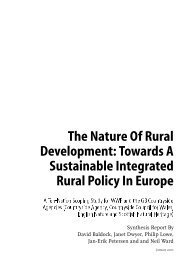
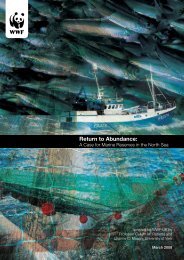
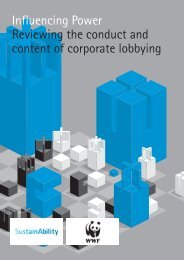
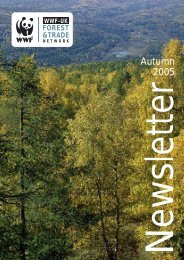

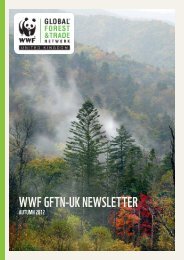


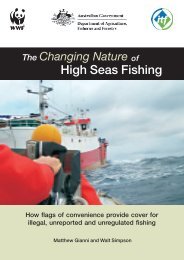

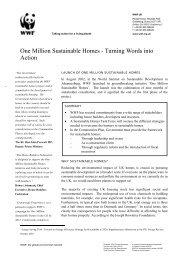
![[PDF] Causes for concern: chemicals and wildlife - WWF UK](https://img.yumpu.com/31929970/1/184x260/pdf-causes-for-concern-chemicals-and-wildlife-wwf-uk.jpg?quality=85)
